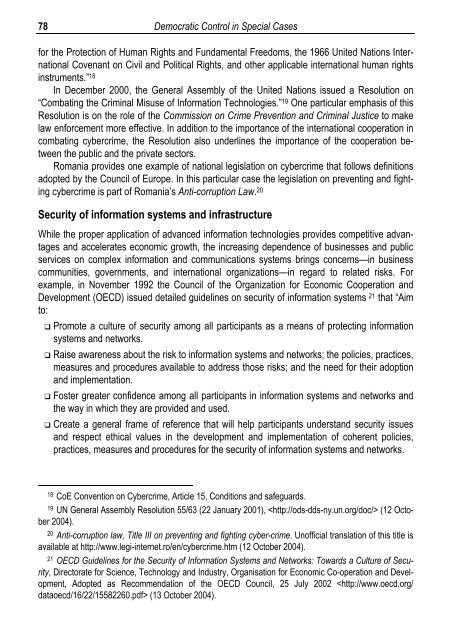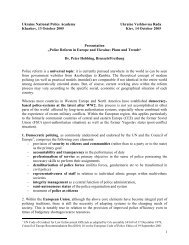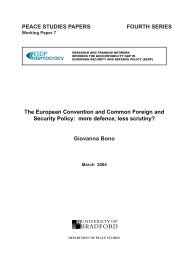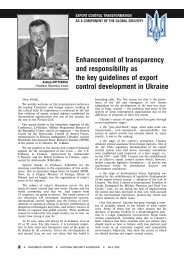Civil-Military Relations and Democratic Control of the Security Sector
Civil-Military Relations and Democratic Control of the Security Sector
Civil-Military Relations and Democratic Control of the Security Sector
Create successful ePaper yourself
Turn your PDF publications into a flip-book with our unique Google optimized e-Paper software.
78<br />
<strong>Democratic</strong> <strong>Control</strong> in Special Cases<br />
for <strong>the</strong> Protection <strong>of</strong> Human Rights <strong>and</strong> Fundamental Freedoms, <strong>the</strong> 1966 United Nations International<br />
Covenant on <strong>Civil</strong> <strong>and</strong> Political Rights, <strong>and</strong> o<strong>the</strong>r applicable international human rights<br />
instruments.” 18<br />
In December 2000, <strong>the</strong> General Assembly <strong>of</strong> <strong>the</strong> United Nations issued a Resolution on<br />
“Combating <strong>the</strong> Criminal Misuse <strong>of</strong> Information Technologies.” 19 One particular emphasis <strong>of</strong> this<br />
Resolution is on <strong>the</strong> role <strong>of</strong> <strong>the</strong> Commission on Crime Prevention <strong>and</strong> Criminal Justice to make<br />
law enforcement more effective. In addition to <strong>the</strong> importance <strong>of</strong> <strong>the</strong> international cooperation in<br />
combating cybercrime, <strong>the</strong> Resolution also underlines <strong>the</strong> importance <strong>of</strong> <strong>the</strong> cooperation between<br />
<strong>the</strong> public <strong>and</strong> <strong>the</strong> private sectors.<br />
Romania provides one example <strong>of</strong> national legislation on cybercrime that follows definitions<br />
adopted by <strong>the</strong> Council <strong>of</strong> Europe. In this particular case <strong>the</strong> legislation on preventing <strong>and</strong> fighting<br />
cybercrime is part <strong>of</strong> Romania’s Anti-corruption Law. 20<br />
<strong>Security</strong> <strong>of</strong> information systems <strong>and</strong> infrastructure<br />
While <strong>the</strong> proper application <strong>of</strong> advanced information technologies provides competitive advantages<br />
<strong>and</strong> accelerates economic growth, <strong>the</strong> increasing dependence <strong>of</strong> businesses <strong>and</strong> public<br />
services on complex information <strong>and</strong> communications systems brings concerns—in business<br />
communities, governments, <strong>and</strong> international organizations—in regard to related risks. For<br />
example, in November 1992 <strong>the</strong> Council <strong>of</strong> <strong>the</strong> Organization for Economic Cooperation <strong>and</strong><br />
Development (OECD) issued detailed guidelines on security <strong>of</strong> information systems 21 that “Aim<br />
to:<br />
Promote a culture <strong>of</strong> security among all participants as a means <strong>of</strong> protecting information<br />
systems <strong>and</strong> networks.<br />
Raise awareness about <strong>the</strong> risk to information systems <strong>and</strong> networks; <strong>the</strong> policies, practices,<br />
measures <strong>and</strong> procedures available to address those risks; <strong>and</strong> <strong>the</strong> need for <strong>the</strong>ir adoption<br />
<strong>and</strong> implementation.<br />
Foster greater confidence among all participants in information systems <strong>and</strong> networks <strong>and</strong><br />
<strong>the</strong> way in which <strong>the</strong>y are provided <strong>and</strong> used.<br />
Create a general frame <strong>of</strong> reference that will help participants underst<strong>and</strong> security issues<br />
<strong>and</strong> respect ethical values in <strong>the</strong> development <strong>and</strong> implementation <strong>of</strong> coherent policies,<br />
practices, measures <strong>and</strong> procedures for <strong>the</strong> security <strong>of</strong> information systems <strong>and</strong> networks.<br />
18 CoE Convention on Cybercrime, Article 15, Conditions <strong>and</strong> safeguards.<br />
19 UN General Assembly Resolution 55/63 (22 January 2001), (12 October<br />
2004).<br />
20 Anti-corruption law, Title III on preventing <strong>and</strong> fighting cyber-crime. Un<strong>of</strong>ficial translation <strong>of</strong> this title is<br />
available at http://www.legi-internet.ro/en/cybercrime.htm (12 October 2004).<br />
21 OECD Guidelines for <strong>the</strong> <strong>Security</strong> <strong>of</strong> Information Systems <strong>and</strong> Networks: Towards a Culture <strong>of</strong> <strong>Security</strong>,<br />
Directorate for Science, Technology <strong>and</strong> Industry, Organisation for Economic Co-operation <strong>and</strong> Development,<br />
Adopted as Recommendation <strong>of</strong> <strong>the</strong> OECD Council, 25 July 2002 (13 October 2004).

















